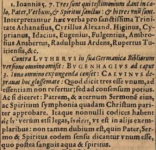Steven Avery
Administrator
Posted on Roger Pearse
https://www.roger-pearse.com/weblog...vita-quote-from-the-three-heavenly-witnesses/
Facebook
https://www.facebook.com/groups/purebible/permalink/2963490057076197/?comment_id=2972492582842611
Abraham Calov refers to the Coccius study on p. 725-726
Biblia Novi Testamenti Illustrata (1719)
Abraham Calov
https://books.google.com/books?id=i_hDAAAAcAAJ&pg=PA1663
https://www.roger-pearse.com/weblog...vita-quote-from-the-three-heavenly-witnesses/
https://www.facebook.com/groups/purebible/permalink/2963490057076197/?comment_id=2972492582842611
Wonderful research, Roger.
This book below by Albert Schönfelder:
De Victore Vitensi episcopo (1901)
Albert Schönfelder (1866-1940)
https://books.google.com/books?id=RasjBkmikDMC&pg=PA1
looks to have more information about the 1500s editions, referencing 1518, and the editio princeps.of:
Jehan Petit,
https://en.wikipedia.org/wiki/Jehan_Petit
who publshed in Paris. And it mentions various editions in the 1530s-1540s.
Also Richard Simon references a Jean Quinten, Basel edition:
https://books.google.com/books?id=2RYzAQAAQBAJ&pg=PA179
Jean Quintin edition - 1541, open to the verse reference
https://books.google.com/books?id=0ZxTAAAAcAAJ&pg=PA26
Also 1541
https://books.google.com/books?id=aUlPAAAAcAAJ&pg=PA653
This historical heavenly witnesses usage seems to have been missed, possibly unseen, or neglected, by Erasmus Beatus Rhenanus, referenced above, was a friend of Erasmus.
We have the Bellarmine 1870 edition, originally written c. 1586, which gives this as evidence for heavenly witnesses authenticity:
https://books.google.com/books?id=vzhEuiwwjkUC&pg=PA104
Jodicus Coccius has a fine apologetic in 1599
https://books.google.com/books?id=f9t5yN0RfVIC&pg=PA725
PRDL mixes together two Jodicus Coccius, this one is:
https://www.biblicalcyclopedia.com/C/coccius-jodocus-(1).html
https://books.google.com/books?id=vPC8m0_cz5wC&pg=PA962
Jodicus Coccius apologetic utilizes Eugenius in 1599 edition
https://books.google.com/books?id=f9t5yN0RfVIC&pg=PA725
References increase in the 1600s, and the Confession of Faith became an integral part of the discussion, through each century and today.
And there is even an interesting and helpful 2013 thread on the contra forum BVDB, Waterrock is James Snapp, who was trying to study and learn. The contras were trying to downplay and dismiss the usage at Carthage.
https://www.tapatalk.com/groups/bib...he-african-bishops-in-carthage-t5547-s20.html
Especially starting on post #41, James goes into the authenticity and significance:
https://www.tapatalk.com/groups/bib...he-african-bishops-in-carthage-t5547-s40.html
=====
And Roger when you refer to "the interpolated passage" this goes against the acceptance of the verse by the many hundred of orthodox and 'Arians' (or homoians) from a wide Meditteranean region. So, your term is anachronistic. And dependent on the very dubious position of the modern textual critics.Let the history speak unfettered!
Thanks, Roger!
Abraham Calov refers to the Coccius study on p. 725-726
Biblia Novi Testamenti Illustrata (1719)
Abraham Calov
https://books.google.com/books?id=i_hDAAAAcAAJ&pg=PA1663
Last edited:


